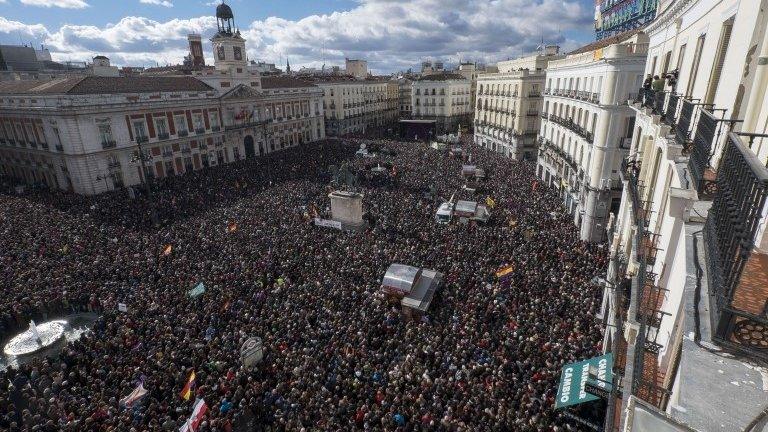Spain's new left-wing mayors promise end to corruption
- Published
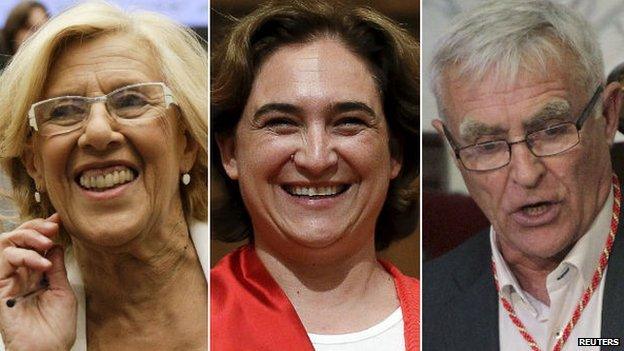
Manuela Carmena, Ada Colau and Joan Ribo have taken charge of Spain's largest cities
A 71-year-old anti-Franco judge, an anti-evictions campaigner and a teacher have been elected mayors of Spain's three biggest cities - as left-wing coalitions swept to power promising an end to corruption.
Manuela Carmena in Madrid and new Barcelona Mayor Ada Colau are the most striking examples of the change, having led completely new political organisations to success.
In Madrid's Cibeles city hall, where many gathered to cheer the counting of votes for a new mayor, Ms Carmena said she wanted to begin "governing by listening".
The former judge's main occupation before the campaign was running her shop selling children's clothes stitched by female prisoners.
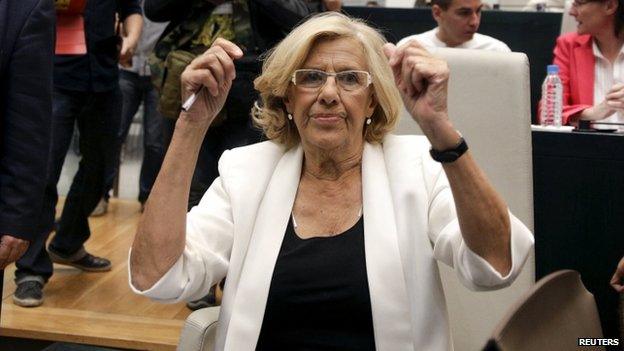
Ms Carmena was a leading anti-Franco activist during the 1970s
She now plans to arrange for council sessions to focus on single policy objectives, such as child poverty, calling in experts and all available data to help formulate solutions.
To the city's poorest, Carmena said: "We are going to improve the situation."

Who are the three new mayors?
Manuel Carmena was a Communist Party member, lawyer and anti-Franco activist before the dictator's death in 1975 and narrowly avoided being shot by fascist terrorists at a Madrid labour law office in 1977. As a judge, Carmena was known for her progressive views and belief in rehabilitation. She has pledged to hold a fully transparent audit of Madrid's debt and public contracts.
Ada Colau rose to national prominence as the key figure in the PAH Mortgage Victims Platform. She led direct protests outside ministers' homes and created human barriers to prevent people from being evicted as Spain's real estate boom turned to bust. As mayor, she promises to slash the salaries and perks of public officials, including her own, halt evictions and clean up city hall corruption.
Joan Ribo, a school and university teacher, has been involved in left-wing Valencia politics since the 1980s and is the main beneficiary of Compromis' impressive results in the 24 May elections, the coalition winning 23% in the city of Valencia and 18% across the region. Like his counterparts in Madrid and Barcelona, he promises urgent action to combat poverty and a public airing of the city's accounts.

Apart from their policy priorities to tackle poverty caused by Spain's economic crisis, all three mayors insist that the style of their rule will be very different.
Spain's leading anti-austerity party Podemos is part of the two groups taking hold of city hall in Madrid and Barcelona - Ahora Madrid and Barcelona en Comu. In Valencia, Mayor Joan Ribo's Coalicio Compromis was formed by leftists, Valencian nationalists and greens in 2010.
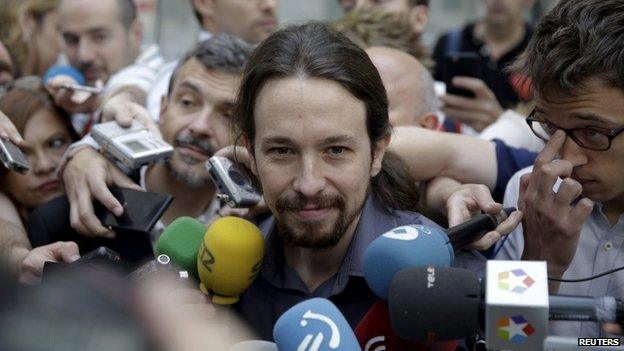
Pablo Iglesias, leader of anti-austerity party Podemos, was present at Ms Carmena's inauguration
However, more than a simple jerk to the left on the political spectrum, the new mayors say they want to redefine politicians' roles, becoming unalloyed conduits for popular will and participation.
'Kick us out'
Thousands gathered to listen to Ada Colau's acceptance speech in Barcelona on Saturday, watching on screens in Sant Jaume square outside the city hall.
"Voting every four years is not enough," she said. "Never trust the idea that we will represent you well. Kick us out if we don't do what we have promised."
Until last year when she got involved in BComu, Ms Colau was regularly photographed being removed by police from a cordon of people blocking a repossession. Now she will be in charge of Barcelona's metropolitan police force.
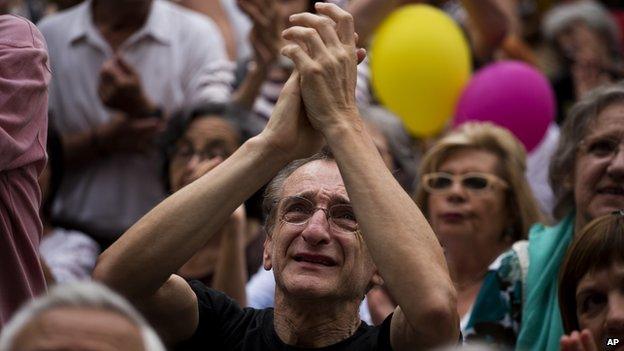
There were emotional scenes in Barcelona following Ada Colau's election
In Valencia, as in Madrid, 24 years of uninterrupted Popular Party rule were brought to an end by a veteran left-winger espousing a new way of doing politics.
"Authoritarianism is over," said 67-year-old Joan Ribo. "I don't want the rod or the rule. I prefer talking with citizens [and] working side-by-side with neighbourhood movements."
Fragmentation
However, the three new mayors do not enjoy majorities in their respective council chambers.
In Madrid and Valencia, potentially stable deals with other left-of-centre parties have been struck, but the situation in Barcelona is more complicated due to the fragmentation of politics along the axes of left and right as well as Catalan sovereignty.
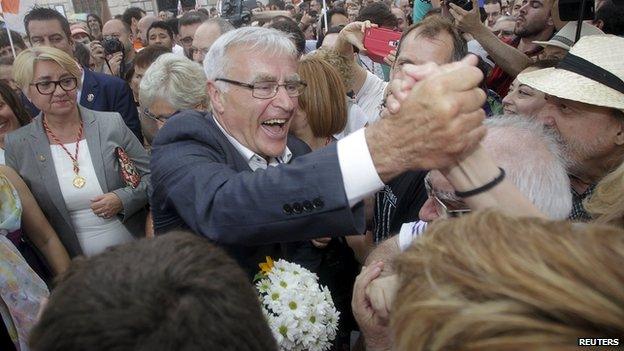
Joan Ribo has been involved in Spanish politics for 30 years
Despite her publicised sympathy for Catalonia's "right to decide", Ada Colau has so far resisted signing up to the nationalist parties' "road map" for independence.
Elsewhere, the Podemos-linked Zaragoza en Comun group took control of Spain's fifth most populous city, while Santiago de Compostela, A Coruna and Cadiz are among other towns and cities which now have left-wing coalition chiefs as mayors.
With a general election looming at the end of the year, Prime Minister Mariano Rajoy described deals between left-wing groups and the chief opposition Socialist Party as "eccentric and sectarian".
His Popular Party was the most-voted for option across Spain and in cities such as Madrid and Valencia, but has only found support from centrist anti-corruption party Citizens in some towns and regions.
- Published23 May 2015
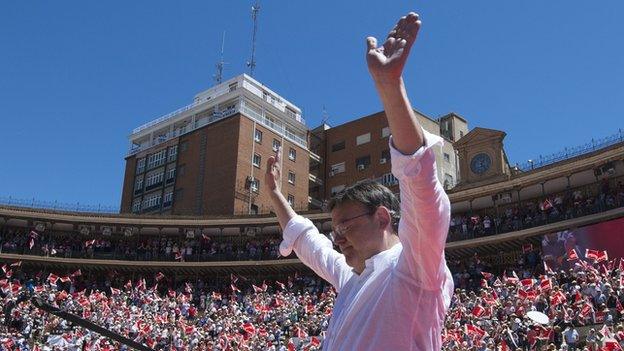
- Published14 March 2015
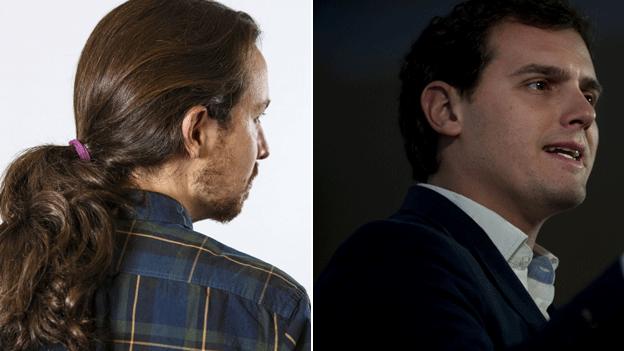
- Published31 January 2015
